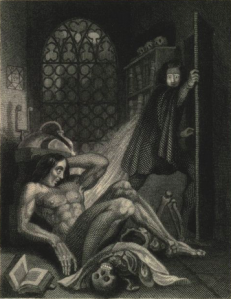Frankenstein is a familiar and well established piece of literature. The vast majority of us have never read the novel and our understanding is based on derivatives such as movies with Boris Karloff and Lon Chaney. In the original novel, the monster doesn’t actually die. He goes off into the Arctic and the novel leaves him there.

It isn’t clear to me that the monster would ever die since, in order for him to live, the normal processes that lead to death would somehow have to be held at bay.
So, what would have become of the monster over time? Shelley portrays him as articulate, intelligent and sensitive. He becomes violent largely in response to rejection by his creator and other people.
The story is set in the late 18th Century. What would become of the monster’s anger over two centuries? Would he remain a hermit or somehow rejoin human society — a participant, but not a charter member?
The first story in this series, Basted Son, has the monster rediscovering his identity and sets a stage for the stories which follow. Admittedly, I’m projecting my own biases on the monster (for example #47 Victor Frenchstone); what would be the biases of a two hundred year-old man?